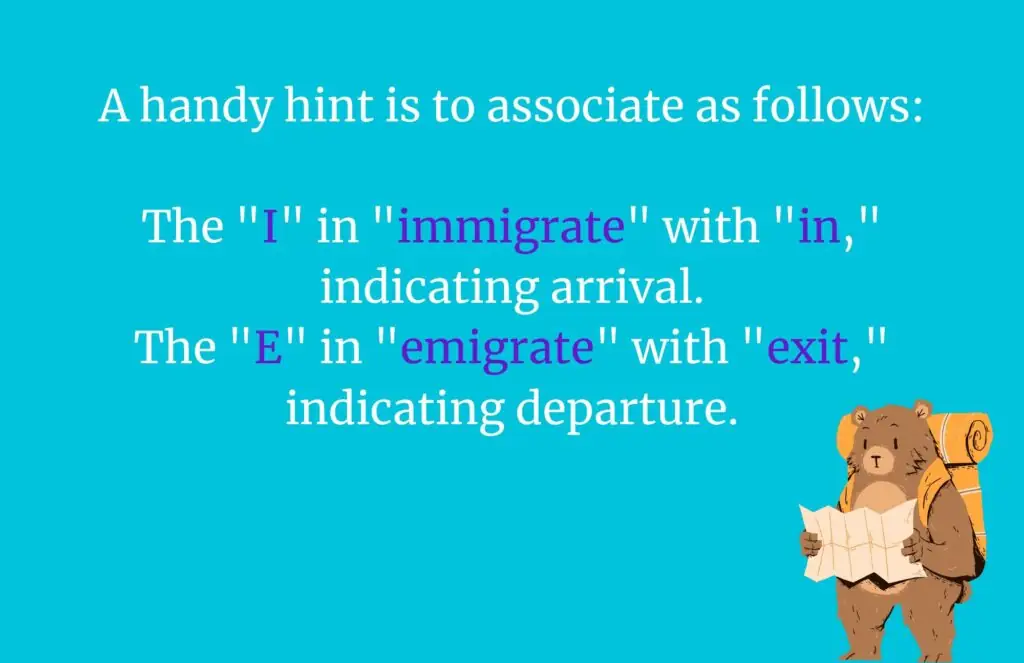The words “immigrate” and “emigrate” are often confused because of their similar spellings and pronunciations. However, they describe two different aspects of the same process: moving from one country to another. The key difference is in the perspective, and you can confuse your readers if you don’t use a grammar check.

✅ AI Essay Writer ✅ AI Detector ✅ Plagchecker ✅ Paraphraser
✅ Summarizer ✅ Citation Generator
“Immigrate” is used when the focus is on entering and settling in a new country; “emigrate” is used when the focus is on leaving one’s native country to live somewhere else.
For example, “She immigrated to Canada last year.” Here, we use ‘immigrate’, because the woman in question came to Canada. And in another example, “He emigrated from Spain to start a new life in the United States” we use ’emigrate’ to signal that the person moved out of Spain.
Basically, “immigrate” is like arriving at a party and being welcomed in. “Emigrate” is like saying goodbye to your friends when you leave said party.
Definition of Immigrate
The term “immigrate” means entering and settling in a country that is not one’s native country. It means moving into a new house in a different neighborhood or city where you plan to live permanently. When someone immigrates, they are called an immigrant.
Here are some examples of how “immigrate” is used in sentences:
- Last year, Maria and her family immigrated to Canada from Brazil, seeking better opportunities.
- Looking for a fresh start, the Chen family decided to immigrate to Australia.
- Canada has seen a significant increase in the number of people who immigrate from different parts of the world each year.
In each of these examples, “immigrate” is used to describe the action of moving to a new country with the intention of making it one’s new home.
Definition of Emigrate
The term “emigrate” means to leave one’s native country to settle in another. It’s like packing up your belongings and moving out of your old house to start a new life somewhere else. When someone emigrates, they are called an emigrant.
Here are some examples of how “emigrate” is used in sentences:
- In the 19th century, many Irish people emigrated to the United States due to famine and economic hardship.
- After completing her studies, Priya emigrated from India to Canada for better career opportunities.
- The political conflict in their homeland led the family to emigrate to a safer country.
Here, “emigrate” is used to describe the action of leaving one’s home country with the intention of living permanently in a different country.
When to Use Emigrate and Immigrate?
Knowing when to use “emigrate” and “immigrate” can be simple if you remember a few tips. Think of “emigrate” as exiting your country and “immigrate” as entering a new one. If you’re talking about leaving, use “emigrate.” For example, “My grandparents emigrated from Italy in the 1950s.”
Use “immigrate” when discussing the action of moving into a new country. For example, “They immigrated to Canada for a better life.”

So, if you’re referring to someone leaving their native country, go with “emigrate.” If you’re talking about someone arriving and settling in a new country, “immigrate” is the right choice.
FAQ
Follow us on Reddit for more insights and updates.





Comments (0)
Welcome to A*Help comments!
We’re all about debate and discussion at A*Help.
We value the diverse opinions of users, so you may find points of view that you don’t agree with. And that’s cool. However, there are certain things we’re not OK with: attempts to manipulate our data in any way, for example, or the posting of discriminative, offensive, hateful, or disparaging material.